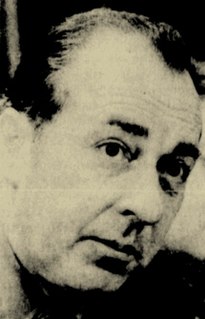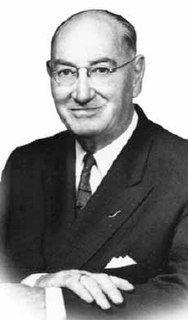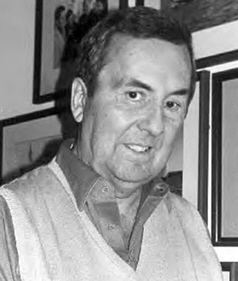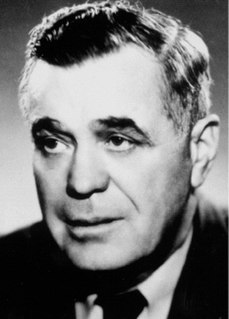Related Research Articles

The Western Hockey League (WHL) is a major junior ice hockey league based in Western Canada and the Northwestern United States. The WHL is one of three leagues that constitutes the Canadian Hockey League (CHL) as the highest level of junior hockey in Canada. Teams play for the Ed Chynoweth Cup, with the winner moving on to play for the Memorial Cup, Canada's national junior championship. WHL teams have won the Memorial Cup 19 times since the league became eligible to compete for the trophy. Many players have been drafted from WHL teams, and have found success at various levels of professional hockey, including the National Hockey League (NHL).

Earl Phillip Dawson was a Canadian ice hockey administrator, politician and civil servant. He rose to prominence in Canadian hockey when he served as president of the Manitoba Amateur Hockey Association from 1958 to 1963. He established a council to reverse the decline of hockey in rural Manitoba and saw the association continually increase its registrations by spending more per player to develop minor ice hockey than other provinces in Canada. Dawson became chairman of the Canadian Amateur Hockey Association (CAHA) rules committee and organized the first nationwide clinic for referee instructors to standardize the interpretation of hockey rules. Dawson became vice-president of the CAHA in 1966 then served as its president from 1969 to 1971. The International Ice Hockey Federation had approved a limited use of professionals at the 1970 Ice Hockey World Championships, but later reversed the decision when the International Olympic Committee objected. Dawson and the CAHA perceived the situation to be a double standard since the Europeans were believed to be state-sponsored professionals labelled as amateurs, and withdrew the Canada men's national ice hockey team from international competitions until it was allowed to use its best players.
The 1968–69 WCHL season was the third season of the Western Canada Hockey League. Eight teams completed a 60-game season, with the Flin Flon Bombers winning the President's Cup.
The 1969–70 WCHL season was the fourth season of the Western Canada Hockey League (WCHL). Eight teams completed a 60-game season, with the Flin Flon Bombers winning their second consecutive President's Cup.
The 1970–71 WCHL season was the fifth season of the Western Canada Hockey League (WCHL). Ten teams completed a 66-game season, with the Edmonton Oil Kings winning the President's Cup.

Donald Stewart Johnson was a Canadian sports executive. He was elected president of the Newfoundland Amateur Hockey Association (NAHA) in 1966, sought to expand minor ice hockey in Newfoundland and negotiated for the NAHA to become a member of the Canadian Amateur Hockey Association (CAHA). He was elected president of the CAHA in 1975, resolved internal disagreement over the jurisdiction of junior ice hockey, avoided the withdrawal of the Western Canada Hockey League and sought a new professional-amateur agreement with the National Hockey League and World Hockey Association. He was part of negotiations to end the Canada men's national ice hockey team hiatus from the Ice Hockey World Championships and the Olympic Games, in exchange for International Ice Hockey Federation approval of the 1976 Canada Cup. He established a long-term sponsorship to improve the National Coaching Certification Program, twice visited China with a Canadian amateur team for instructional tours and arranged an exchange for Chinese players and coaches to attend training camps in Canada. He was chairman of the 1978 World Junior Ice Hockey Championships as the CAHA past-president, and was posthumously credited by Hockey Canada for playing an important role in Canada's return to international competitions and improving Canada's hockey reputation.

George Samuel Dudley was a Canadian ice hockey administrator. He joined the Ontario Hockey Association (OHA) executive in 1928, served as its president from 1934 to 1936, and as its treasurer from 1936 to 1960. He was elected to Canadian Amateur Hockey Association (CAHA) executive in 1936, served as its president from 1940 to 1942, as its secretary from 1945 to 1947, and as its secretary-manager from 1947 to 1960. He was secretary of the International Ice Hockey Association from 1945 to 1947, and was later vice-president of the International Ice Hockey Federation (IIHF) from 1957 to 1960. He was expected to become the next president of the IIHF before his death. He graduated from Osgoode Hall Law School in 1917 then practiced law for 43 years as the town solicitor for Midland, Ontario.
The 1974–75 OMJHL season was the first season of the Ontario Major Junior Hockey League. The league operated semi-autonomously while still being part of the Ontario Hockey Association. The OMJHL inaugurated the William Hanley Trophy, awarded to the most sportsmanlike player. Eleven teams each played 70 games. The Toronto Marlboros won the J. Ross Robertson Cup, defeating the Hamilton Fincups.

Allan Wilfrid Pickard was a Canadian ice hockey administrator, who served as president of the Canadian Amateur Hockey Association (CAHA) from 1947 to 1950. When Canada opted out of the 1947 Ice Hockey World Championships and decided not to participate in the 1948 Winter Olympics, Pickard felt that Canada was obliged to send a team due to its place as a top hockey nation, and nominated the Ottawa RCAF Flyers who won the gold medal for Canada and lived up to the requirements of the Olympic Oath as amateurs. Despite disagreement with the International Olympic Committee, he sought for the International Ice Hockey Federation to adopt the CAHA definition of amateur in the face of increasing difficulty in selecting the Canada men's national ice hockey team.

Frederick Page was a Canadian ice hockey administrator and ice hockey referee. He originated from Port Arthur, Ontario, where he played junior ice hockey, refereed locally and later at the Memorial Cup and Allan Cup competitions. He was a league executive in Fort William, then served as president of the Thunder Bay Amateur Hockey Association from 1958 to 1962. He was elected second vice president of the Canadian Amateur Hockey Association (CAHA) in 1962, and rose up the ranks to be its president from 1966 to 1968. Page wanted the CAHA to gain more control over its affairs, and become less dependent on the National Hockey League (NHL). Under his leadership, the NHL ended direct sponsorship of junior hockey teams. He was instrumental in negotiating the revised agreement for the NHL Amateur Draft in 1967, and later served as co-chairman of the resulting joint player development committee.

Gordon Ralph Renwick was a Canadian ice hockey administrator, who served as president of the Canadian Amateur Hockey Association (CAHA), vice-president of the International Ice Hockey Federation (IIHF), and was the team president of the Galt Hornets.

William George Hardy was a Canadian professor, writer, and ice hockey administrator. He lectured on the Classics at the University of Alberta from 1922 to 1964, and served as president of the Canadian Authors Association. He was an administrator of Canadian and international ice hockey, and served as president of the Alberta Amateur Hockey Association, the Canadian Amateur Hockey Association (CAHA), the International Ice Hockey Association, and the International Ice Hockey Federation.

William John Devine was a Canadian ice hockey administrator and radio sports commentator. He worked for CJBQ radio in Belleville, Ontario for 40 years as the sports director. He was involved with the local sports scene, and was president of the Ontario Hockey Association from 1967 to 1969. He moved up to the national level in 1969 becoming vice-president of the Canadian Amateur Hockey Association (CAHA) in 1969, and later served as its president from 1973 to 1975.

Joseph Julius Kryczka was a Canadian ice hockey administrator, coach and referee, and had a legal career as a lawyer and judge, where he was commonly known as "Justice Joe".

Lloyd Thompson Pollock was a Canadian ice hockey administrator and businessman. After running the Windsor City Hockey League, he assisted in the foundation of the Windsor Softball League, and later started a junior ice hockey league in Windsor, Ontario. He was a cofounder of the International Hockey League in 1945, and founder of the original Windsor Spitfires junior team in 1946. He served as president of the Ontario Hockey Association (OHA) from 1961 to 1963, welcomed the Montreal Junior Canadiens into the OHA when it was divided by the Metro Junior A League, and supported measures to preserve the Northern Ontario Hockey Association.

Clarence Vincent "Tubby" Schmalz was a Canadian ice hockey administrator. He served as vice-president of the Western Ontario Athletic Association from 1940 to 1950, and coached and managed the senior ice hockey team in Walkerton, Ontario. He was elected to the Ontario Hockey Association executive (OHA) in 1956, and served as its president from 1969 to 1972. He was the first commissioner of the Ontario Major Junior Hockey League (OMJHL), serving from 1974 to 1978. He became vice-chairman of the Canadian Amateur Hockey Association (CAHA) in 1979, and was elected its chairman in 1981. He was a graduate of St. Jerome's College, and operated the Hartley House hotel in Walkerton. He served on the Walkerton Town Council for 17 years, including three years as reeve from 1979 to 1981.

Frank Forest Sargent was a Canadian sports executive in ice hockey and curling. He served as president of the Canadian Amateur Hockey Association (CAHA) from 1942 to 1945, and was president of the Dominion Curling Association (DCA) from 1965 to 1966. He was the first person to be elected to more than two terms as CAHA president, and the first to be president of two national amateur sporting associations in Canada.

Ronald James Butlin was a Canadian ice hockey executive. He was president of the Western Canada Hockey League (WCHL) from 1968 to 1971, when the league separated from the Canadian Amateur Hockey Association (CAHA) due to grievances arising from the National Hockey League (NHL) agreement for the NHL Amateur Draft. He also served as president of the Canadian Hockey Association from 1968 to 1970, which was formed as a national governing body of junior ice hockey in Canada, in opposition to the CAHA. He sought to raise the age limit imposed by the NHL and negotiate better financial terms for the junior teams which developed future professional players. He criticized the CAHA for its spending on administration and wanted hockey policy to be determined by the teams instead of elected officials. He negotiated an agreement to reunite the WCHL with the CAHA in 1970, where the WCHL gained direct representation on the CAHA junior council, better financial return for drafted players, and received development grants from the NHL.

Cecil Charles Duncan was a Canadian ice hockey administrator. He served as president of the Canadian Amateur Hockey Association (CAHA) from 1936 to 1938 and led reforms towards semi-professionalism in ice hockey in Canada. He served as chairman of the CAHA committee which proposed a new definition of amateur to eliminate what it called "shamateurism", in the wake of Canada's struggles in ice hockey at the 1936 Winter Olympics. He negotiated a series of agreements to protect the CAHA's interests, and to develop relationships with all other areas of the world where hockey was played. The agreements allowed the CAHA to become independent of the Amateur Athletic Union of Canada which wanted to keep the old definition of pure amateurism. Duncan's reforms also returned the CAHA to affluence after four years of deficits during the Great Depression and increased player registrations in Canada.

Lionel Fleury was a Canadian ice hockey administrator who served as president of the Canadian Amateur Hockey Association from 1964 to 1966. Under his leadership, the Canada men's national ice hockey team transitioned from student athletes coached by Father David Bauer into a year-round national team program. Fleury welcomed the Newfoundland Amateur Hockey Association as a new branch member of the national association in 1966, and changed the format of the Memorial Cup playoffs in Eastern Canada from an elimination bracket into a round-robin format to reduce travel costs and address concerns of imbalanced competition. He sought an end to the National Hockey League system of sponsoring amateur teams by replacing it with a draft of players who had graduated from junior ice hockey, and negotiated for a new agreement that was realized after his term as president concluded.
References
- ↑ "Sweeping Changes In Pro-Am Hockey Pact". Winnipeg Free Press. Winnipeg, Manitoba. August 19, 1966. p. 22.

- ↑ "CMJHL Defies CHA – Ready To Roll". Brandon Sun. Brandon, Manitoba. October 6, 1966. p. 6.

- 1 2 Briscoe, Bob (August 13, 1968). "'Captain' Butlin Can Claim First Round". Winnipeg Free Press. Winnipeg, Manitoba. p. 42.

- ↑ "Action Opened By Junior Loop". Lethbridge Herald. Lethbridge, Alberta. March 30, 1967. p. 11.

- ↑ "CMJHL Now Becomes WCJHL". Brandon Sun. Brandon, Manitoba. May 27, 1967. p. 12.

- ↑ "WCJHL Move Causes New Controversy". Brandon Sun. Brandon, Manitoba. May 29, 1968. p. 8.

- ↑ "West Juniors Change Name". Winnipeg Free Press. Winnipeg, Manitoba. June 8, 1968. p. 56.

- 1 2 "B.C. Loop Threatens Secession". Lethbridge Herald. Lethbridge, Alberta. June 24, 1968. p. 9.

- ↑ "Ontario League Joins CHA Group". Lethbridge Herald. Lethbridge, Alberta. June 13, 1968. p. 10.

- ↑ Marshall, Brian (August 8, 1968). "CHA's Ron Butlin foresees a bright future for WCHL". Brandon Sun. Brandon, Manitoba. p. 6.

- ↑ "Council Encourages League". Winnipeg Free Press. Winnipeg, Manitoba. August 13, 1968. p. 40.

- 1 2 Davis, Reyn (March 5, 1969). "CHA Is Big In The East". Winnipeg Free Press. Winnipeg, Manitoba. p. 49.

- ↑ "'Sheer Nonsense' Says Ron Butlin". Lethbridge Herald. Lethbridge, Alberta. September 26, 1968. p. 9.

- ↑ "Butlin Sees Plans Take Lumps". Lethbridge Herald. Lethbridge, Alberta. July 12, 1968. p. 9.

- ↑ "Western Canada League outlines future plans". Brandon Sun. Brandon, Manitoba. June 10, 1968. p. 7.

- ↑ Vipond, Jim (June 22, 1968). "Pros Stomp CHA". Winnipeg Free Press. Winnipeg, Manitoba. p. 54.

- ↑ "Butlin Confident". Lethbridge Herald. Lethbridge, Alberta. August 20, 1968. p. 6.

- ↑ "Campbell Backs CAHA". Winnipeg Free Press. Winnipeg, Manitoba. September 19, 1968. p. 48.

- 1 2 "Nats Discriminating Against CHA–Butlin". Winnipeg Free Press. Winnipeg, Manitoba. October 5, 1968. p. 64.

- ↑ "Butlin Attacks CAHA Policies". Winnipeg Free Press. Winnipeg, Manitoba. October 4, 1968. p. 29.

- ↑ Briscoe, Bob (October 24, 1968). "Another Sequel In CHA–CAHA Hassle: Now Money Enters The Picture". Winnipeg Free Press. Winnipeg, Manitoba. p. 61.

- ↑ Briscoe, Bob (November 7, 1968). "The Way The CAHA Sees It CHA Teams Are Now Defunct". Winnipeg Free Press. Winnipeg, Manitoba. p. 54.

- ↑ "New Association Plans Legal Action". Winnipeg Free Press. Winnipeg, Manitoba. January 20, 1969. p. 18.

- ↑ Briscoe, Bob (November 5, 1968). "Butlin's Move Won't Enhance CHA's Cause". Winnipeg Free Press. Winnipeg, Manitoba. p. 36.

- ↑ Briscoe, Bob (November 4, 1968). "Butlin Wants Pacts Honored". Winnipeg Free Press. Winnipeg, Manitoba. p. 39.

- ↑ Briscoe, Bob (November 26, 1968). "CHA Chooses To Ignore Ex-Jets". Winnipeg Free Press. Winnipeg, Manitoba. p. 38.

- ↑ Briscoe, Bob (February 10, 1969). "Legal Battle Over Goring?". Winnipeg Free Press. Winnipeg, Manitoba. p. 20.

- ↑ Briscoe, Bob (February 11, 1969). "Goring Affair Is THE Topic". Winnipeg Free Press. Winnipeg, Manitoba. p. 53.

- ↑ "Maverick Ontario League May Expand Next Season". Winnipeg Free Press. Winnipeg, Manitoba. December 26, 1968. p. 58.

- ↑ Davis, Reyn (March 8, 1969). "B.C. Next Stop For WCHL?". Winnipeg Free Press. Winnipeg, Manitoba. p. 58.

- ↑ "Bombers and Barons in East-West Final". Brandon Sun. Brandon, Manitoba. April 28, 1969. p. 7.

- ↑ "Butlin Issues CHA Challenge". Winnipeg Free Press. Winnipeg, Manitoba. May 6, 1969. p. 25.

- ↑ "East Quits Hockey Finals". Winnipeg Free Press. Winnipeg, Manitoba. May 6, 1969. p. 1.

- ↑ Davis, Reyn (May 7, 1969). "Barons Get Home On Handouts". Winnipeg Free Press. Winnipeg, Manitoba. p. 60.

- ↑ Davis, Reyn (May 6, 1969). "Flin Flon Awarded Game". Winnipeg Free Press. Winnipeg, Manitoba. p. 25.

- ↑ "Disgraceful, Says Butlin". Winnipeg Free Press. Winnipeg, Manitoba. May 7, 1969. p. 60.

- ↑ "Bombers Would Return To St. Thomas". Winnipeg Free Press. Winnipeg, Manitoba. May 8, 1969. p. 55.

- ↑ "Barons Get Time To Think It Over". Winnipeg Free Press. Winnipeg, Manitoba. May 14, 1969. p. 63.

- ↑ "CAHA may seek peace". Medicine Hat News. Medicine Hat, Alberta. May 20, 1969. p. 9.

- ↑ "CAHA courting WCHL?". Brandon Sun. Brandon, Manitoba. May 21, 1969. p. 6.

- ↑ "President of CHA swings at NHL money allotment". Medicine Hat News. Medicine Hat, Alberta. June 17, 1969. p. 4.

- ↑ "WCHL – CAHA kiss and make up". Medicine Hat News. Medicine Hat, Alberta. July 31, 1969. p. 6.

- ↑ "Peace Talks Not Smooth". Lethbridge Herald. Lethbridge, Alberta. September 9, 1969. p. 7.

- ↑ "AJHL Head Man Denies Threat". Winnipeg Free Press. Winnipeg, Manitoba. September 16, 1969. p. 54.

- ↑ "Door Is Open, But Money Stops Entry". Winnipeg Free Press. Winnipeg, Manitoba. October 4, 1969. p. 63.

- ↑ Gilchrist, Kent (October 10, 1969). "Western Junior Loop Prefers Bandit Role". Winnipeg Free Press. Winnipeg, Manitoba. p. 42.

- ↑ "Junior Outlaws Will Use Court". Winnipeg Free Press. Winnipeg, Manitoba. October 17, 1969. p. 30.

- ↑ Penton, Bruce (January 30, 1970). "Refs start the big push". Brandon Sun. Brandon, Manitoba. p. 6.

- ↑ Davis, Reyn (November 28, 1969). "East-West Final Is Up To WCHL". Winnipeg Free Press. Winnipeg, Manitoba. p. 47.

- ↑ "The Gap Grows Wider". Winnipeg Free Press. Winnipeg, Manitoba. March 9, 1970. p. 18.

- ↑ "Meeting was 'a farce'". Brandon Sun. Brandon, Manitoba. March 9, 1970. p. 7.

- ↑ "Delegates Stomp Out Of CAHA Meeting". Winnipeg Free Press. Winnipeg, Manitoba. May 28, 1970. p. 62.

- ↑ "Judge Supports WCHL But Raps The System". Winnipeg Free Press. Winnipeg, Manitoba. May 29, 1970. p. 41.

- ↑ O'Shaughnessy, Mike (June 25, 1970). "CAHA And WCHL Sign Two-Year Agreement". Winnipeg Free Press. Winnipeg, Manitoba. p. 55.

- ↑ "Paul Cooper attends camp". Halton Hills Acton Free Press. Halton Hills, Ontario. October 7, 1970. p. 4.
